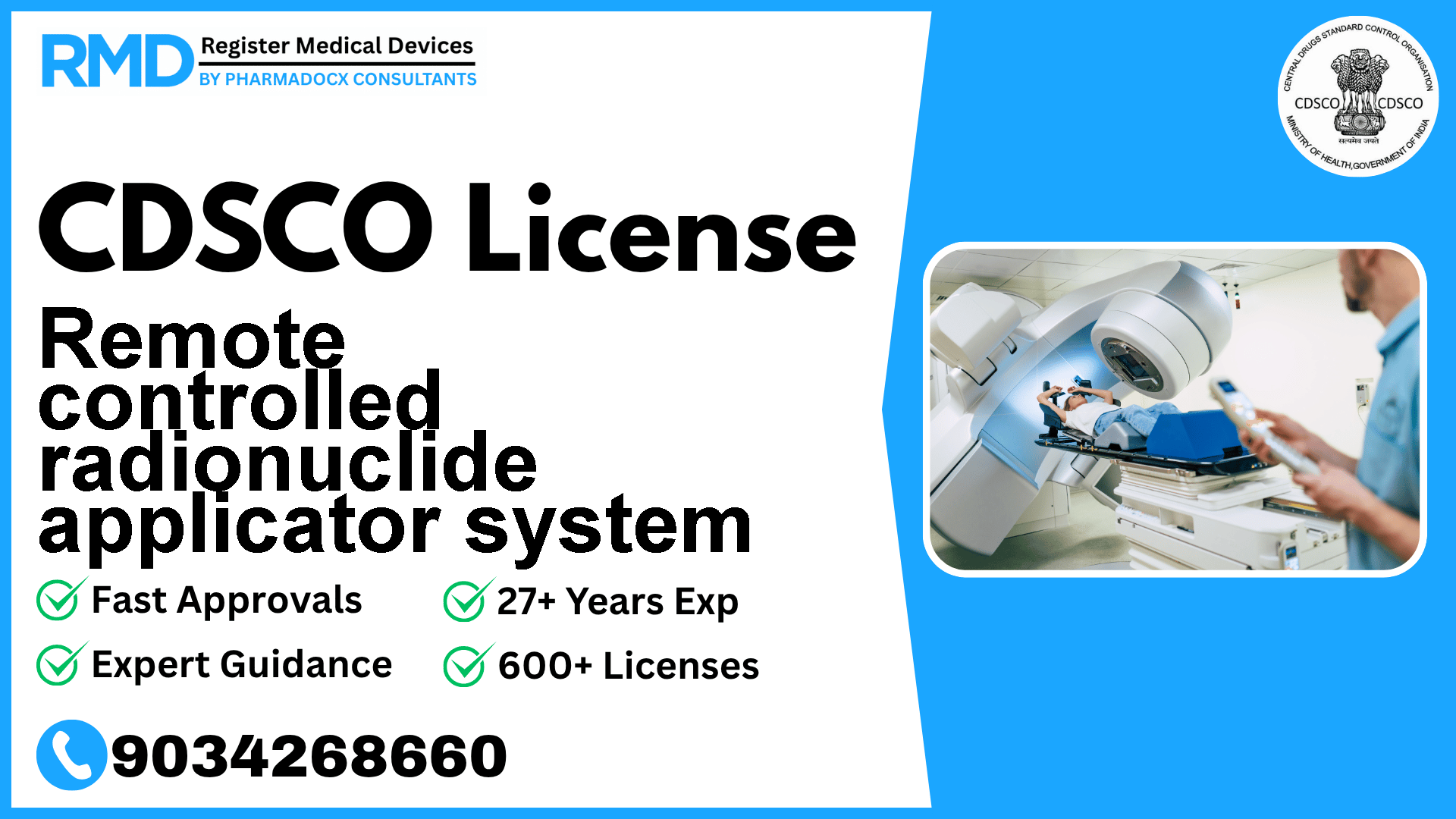CDSCO License for Remote controlled radionuclide applicator system
Medical Device Information
Intended Use
A remote controlled radionuclide applicator system is an electromechanical or pneumatic device intended to enable an operator to apply, by remote control, a radionuclide source into the body or to the surface of the body for radiation therapy.

Comprehensive Guide to CDSCO Licensing for Remote Controlled Radionuclide Applicator Systems
With over 25 years of experience assisting more than 500 companies, we understand the complexities of navigating the CDSCO regulatory landscape for sophisticated medical devices. The remote controlled radionuclide applicator system, classified as a Class C medical device under the Indian regulatory framework, is a critical tool in radiotherapy enabling precise delivery of radionuclide sources via remote operation. Ensuring compliance with CDSCO norms is essential for timely market entry and sustained product availability in India.
CDSCO Regulatory Framework for Remote Controlled Radionuclide Applicator Systems
The Central Drugs Standard Control Organization (CDSCO) governs medical device registration and licensing in India. This device falls under the Class C risk category due to its direct involvement with radioactive material and patient safety implications. Compliance involves adherence to the Medical Device Rules (MDR), 2017, along with fulfilling notification requirements as per File No. 29/Misc./03/2020-DC (180), dated 6.8.2021.
Risk Classification and License Requirements
- Risk Class: C
- Regulatory Authority: Central Licensing Authority (CLA)
- Applicable Licenses:
- MD9 Manufacturing License (Form MD7) for Indian manufacturers
- MD15 Import License (Form MD14) for importers
Class C devices require stringent controls including a detailed audit, product testing, and comprehensive documentation to demonstrate safety and efficacy.
Manufacturing License Process (MD9)
Manufacturers of remote controlled radionuclide applicator systems must apply for an MD9 license through the CDSCO MD Online Portal. Here's a stepwise overview:
- Test License (MD13): Initiate by obtaining a test license, valid for 1.5-2 months, allowing product testing in government-approved laboratories.
- Product Testing: Conduct required tests in notified labs to validate compliance with standards.
- Document Preparation: Compile detailed technical documentation, including Device Master File (DMF) and Plant Master File (PMF).
- Application Submission: File MD9 license application on the CDSCO portal.
- CDSCO Inspection & Audit: CDSCO officials conduct facility inspections and review documents.
- Query Resolution: Address any observations or queries raised.
- License Grant: Upon satisfactory review, the MD9 license is issued.
For detailed guidance, refer to our MD9 License Guide.
Manufacturing License Documents Required
- Company constitution and incorporation certificates
- Proof of ownership or lease of manufacturing premises
- Qualifications and experience of technical staff
- No objection certificates (NOC) for fire safety and pollution control
- Device Master File (DMF) detailing design, manufacturing, and safety data (Learn more)
- Plant Master File (PMF) describing manufacturing environment and processes (Guide here)
- Essential Principles Checklist confirming compliance with Indian MDR
- Risk Management File aligning with ISO 14971 standards (Risk management insights)
- Test reports from CDSCO-approved laboratories (List of testing labs)
- Product labels and Instructions for Use (IFU)
- Quality Management System (QMS) documentation, typically ISO 13485:2016 certified
Import License Process (MD15)
Importers of this Class C device must secure an MD15 import license issued by the Central Licensing Authority. The process entails:
- Document Compilation: Collect all required certificates and licenses.
- Application Submission: Apply on the CDSCO MD Online Portal using Form MD14.
- Query/Deficiency Resolution: Respond promptly to any clarifications sought.
- License Issuance: After review, the MD15 license is granted.
Unlike manufacturing, import licensing does not require a test license but demands comprehensive documentation and certifications to establish product legitimacy.
Import License Documents Required
- Valid manufacturing license (MD9) from country of origin
- Free Sale Certificate or Certificate of Market Authorization
- ISO 13485:2016 Quality Management System certificate
- CE Certificate or equivalent international approvals
- Device Master File (DMF) and Plant Master File (PMF)
- Wholesale license for distribution
- Company constitution and registration documents
Timeline and Processing Duration
| License Type | Process Steps | Estimated Duration |
|---|---|---|
| MD9 Manufacturing | Test license, testing, audit, query resolution | 4-5 months |
| MD15 Import | Document review, query resolution, approval | 5-6 months |
Manufacturers should anticipate initial 1.5-2 months for test license and product testing before license application.
Government Fees and Costs
- MD9 Manufacturing License:
- Application fee: ₹50,000
- Per product fee: ₹1,000
- MD15 Import License:
- Class C & D devices: ₹3,000 per site + ₹1,500 per product
Budgeting for fees alongside costs for testing, documentation, and consultancy is crucial for smooth project planning.
Common Challenges and Solutions
- Delays in Test Reports: Coordinate early with government-approved labs to schedule testing; refer to the CDSCO Testing Laboratories list.
- Incomplete Documentation: Leverage expert consultancy to prepare comprehensive DMFs and PMFs.
- Audit Non-compliance: Conduct thorough internal audits and pre-inspections; consider engaging a notified body for pre-audit assessments.
- Query Handling: Maintain proactive communication with CDSCO officials to resolve queries promptly and avoid unnecessary delays.
Expert Consultation and Support
Our seasoned regulatory consultants provide end-to-end support—from documentation preparation, product testing coordination, to audit management and liaison with CDSCO authorities. Our consistent track record of over 500 successful CDSCO licenses for complex Class C devices like the remote controlled radionuclide applicator system underscores our commitment to your success.
Getting Started with Your CDSCO License Application
- Register on the CDSCO MD Online Portal to create your company profile.
- Initiate the MD13 test license application to kickstart product testing.
- Engage a notified body early for audit readiness and quality system alignment.
- Prepare your Device and Plant Master Files using expert templates and guidelines.
- Compile all technical, safety, and quality documentation according to the MDR.
- Submit your MD9 manufacturing license application post-test report receipt.
- For importers, gather all certificates and apply for the MD15 license concurrently.
By following these practical steps and leveraging expert support, manufacturers and importers can confidently navigate the CDSCO regulatory process for your remote controlled radionuclide applicator system and achieve timely market access in India.